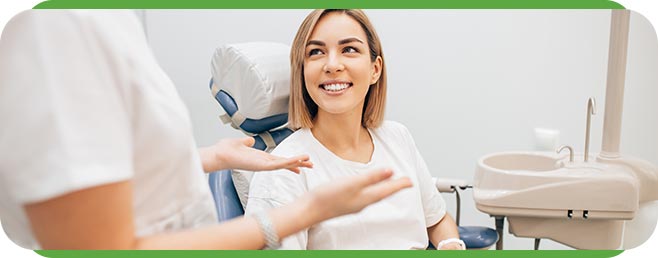When Do You Need to See a Neuromuscular Dentist?
Neuromuscular TMJ disorder treatment focuses on treating any underlying issues with the nervous system and the muscles surrounding the jaw, causing headaches, earaches, facial pain, and difficulty in jaw movement. Get comprehensive treatment for Neuromuscular TMJ at Koala Center For Sleep & TMJ Disorders. For more information, please contact us today or request an appointment online. We have convenient locations in Bloomington IL, Peoria/Dunlap IL, El Paso TX, and Wausau WI.


Table of Contents:
Is TMJ a neuromuscular disorder?
What is the neuromuscular treatment for TMJ?
What neurological disorders cause TMJ?
When do you need to see a neuromuscular dentist?
Temporomandibular joint (TMJ) disorder is a condition that affects the jaw joint. As the TMJ connects the lower jawbone to the skull, it plays a critical role in essential daily activities such as chewing, speaking, and even breathing. TMJ disorder causes a range of painful symptoms, including headaches, earaches, facial pain, and difficulty opening or closing the mouth.
While TMJ disorder can be caused by a variety of factors, including injury, arthritis, or teeth grinding, it is often considered a neuromuscular disorder. Specifically, TMJ disorder occurs when the muscles that move the jaw become overworked or tense, causing pain and discomfort.
A neuromuscular approach to TMJ disorder treatment focuses on correcting any underlying issues with the nervous system and the muscles surrounding the jaw. This often involves techniques such as physical therapy, massage, and the use of a custom mouthguard to reposition the jaw and reduce tension in the muscles. By addressing the root causes of TMJ disorder, a neuromuscular approach can provide long-lasting relief from symptoms.
In summary, TMJ disorder is a complex neuromuscular disorder that affects the nervous system and the jaw muscles. If you are experiencing symptoms of TMJ disorder, it is essential to consult a healthcare professional to determine the most effective course of treatment for your needs.
Neuromuscular treatment for TMJ disorder focuses on addressing the underlying issues with the nervous system and the muscles surrounding the jaw. It aims to reduce pain and discomfort by restoring balance and function to the jaw joint and muscles.
One of the key techniques used in neuromuscular treatment for TMJ disorder is physical therapy. Physical therapy involves massage, trigger point therapy, and other hands-on techniques to minimize muscle tension and restore range of motion.
A common approach to neuromuscular treatment for TMJ disorder is the use of a special mouthguard, also known as an orthotic appliance. These mouthguards are custom-made to fit your teeth and jaw, and they help to reposition the jaw into a more natural, relaxed position. This treatment reduces tension in the muscles of the jaw and enhances overall function.
Several neurological disorders cancontribute to the development of TMJ disorder, including:
– Trigeminal neuralgia – This condition causes severe facial pain, including pain in the jaw and around the ears. Trigeminal neuralgia is caused by irritation or damage to the trigeminal nerve, which provides sensation to the face.
– Bell’s palsy – Bell’s palsy causes temporary paralysis of the facial muscles, often on one side of the face. This typically affects the muscles involved in chewing.
– Parkinson’s disease – Parkinson’s is a neurodegenerative disorder that primarily affects movement and coordination. It can cause tremors, stiffness, and difficulty with jaw movement, which can contribute to TMJ disorder.
– Multiple sclerosis (MS) – This is a chronic autoimmune disorder that impacts the central nervous system. MS can cause muscle weakness, spasticity, and difficulty with coordination, which can contribute to TMJ disorder.
– Cervical dystonia – This neurological disorder causes involuntary contractions of the neck muscles. It affects the muscles involved in jaw movement and can lead to TMJ disorder.
You should see a neuromuscular dentist if you are experiencing symptoms of TMJ disorder, such as:
– Pain or tenderness in the jaw, face, or neck
– Limited movement or locking of the jaw
– Headaches or earaches
– Difficulty chewing or biting
– Clicking or popping sounds when opening or closing the mouth
– Teeth grinding or clenching
– Sensitive or worn teeth
Neuromuscular dentists specialize in diagnosing and treating TMJ disorder using a holistic approach that considers the dynamics between the teeth, jaw, muscles, and nerves of the face and neck. A neuromuscular dentist can help you identify the underlying cause of your TMJ disorder and develop a personalized treatment plan to address your concerns.
If you are experiencing symptoms of TMJ disorder, it is important to consult a specialist to determine the best course of treatment for your needs. If you are interested in pursuing neuromuscular treatment options, our knowledgeable team is here to help!
If you’re dealing with jaw pain, headaches, or bite issues that don’t improve with regular dental care, it may be time to see a neuromuscular dentist. At Koala® Center For Sleep & TMJ Disorders, our doctors specialize in diagnosing and treating conditions related to the temporomandibular joint (TMJ) and neuromuscular issues that affect your bite. A neuromuscular dentist focuses on the alignment of the jaw and its relationship to the muscles, nerves, and bones surrounding it.
If you’re experiencing symptoms such as chronic jaw pain, teeth grinding, facial pain, or difficulty opening your mouth, it’s crucial to seek help. Our team at Koala® Center For Sleep & TMJ Disorders will provide a comprehensive assessment and personalized treatment plan to relieve your discomfort and restore proper jaw function. Don’t wait—schedule an appointment today and let us help you find lasting relief.

Additional Services You May Need
▸ KoalaKIDZzz®
▸ Sleep Apnea
▸ Snoring
▸ TMJ Disorder
▸ Fatigue
▸ Sleep Disorders
▸ Weight Loss
▸ CPAP Alternative
▸ Oral Appliances




